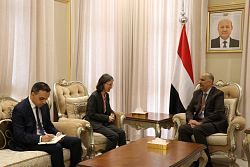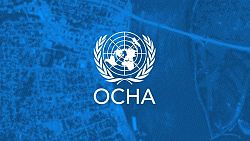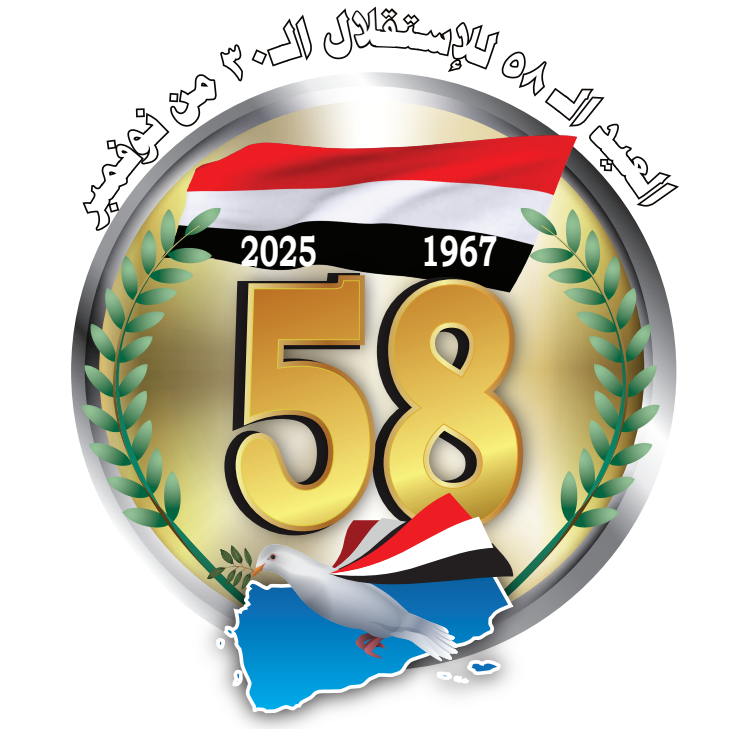
Minister of Finance Discusses Enhancing Economic, Development Cooperation with French Ambassador
The Minister of Finance Marwan bin Ghanem met Tuesday with the French Ambassador to Yemen Catherine Corm-Kammoun.

OCHA: Regional Escalation Directly Impacting Humanitarian Conditions in Gaza and the West Bank
United Nations Office for the Coordination of Humanitarian Affairs has warned that ongoing regional escalation is directly worsening the humanitarian situation in Gaza and the West Bank.

Korea large companies' exports rise 10 percent
Large companies' exports in South Korea rose approximately 10 percent year-on-year in the fourth quarter of last year, driven by increased global demand for semiconductors.

Saudi League: Al-Nassr, Al-Ettifaq and Neom Secure Victories Over Al-Ittihad, Damac and Al-Riyadh
Al-Nassr defeated its guest Al-Ittihad 2–0 in the match that brought them together at Al-Awwal Park Stadium in Riyadh, as part of the 21st round of the Saudi Professional League.
Last Update: ،
2026/03/03
Time
06:27:03
Latest News:
 Minister of Local Administration, UNDP Discuss Support for Decentralization
Minister of Local Administration, UNDP Discuss Support for Decentralization
 Foreign Ministry Denounces Iran’s Attack on U.S. Embassy in Riyadh
Foreign Ministry Denounces Iran’s Attack on U.S. Embassy in Riyadh
 Ambassador Al-Sunaini, Japanese Lawmaker Discuss Boosting Parliamentary Cooperation
Ambassador Al-Sunaini, Japanese Lawmaker Discuss Boosting Parliamentary Cooperation
 Ambassador Al-Sunaini Meets Special Advisor to Japanese PM
Ambassador Al-Sunaini Meets Special Advisor to Japanese PM
 Planning Minister Discusses Intervention Plans and Future Cooperation with UNDP
Planning Minister Discusses Intervention Plans and Future Cooperation with UNDP
Latest News:
 Minister of Local Administration, UNDP Discuss Support for Decentralization
Minister of Local Administration, UNDP Discuss Support for Decentralization
 Foreign Ministry Denounces Iran’s Attack on U.S. Embassy in Riyadh
Foreign Ministry Denounces Iran’s Attack on U.S. Embassy in Riyadh
 Ambassador Al-Sunaini, Japanese Lawmaker Discuss Boosting Parliamentary Cooperation
Ambassador Al-Sunaini, Japanese Lawmaker Discuss Boosting Parliamentary Cooperation
 Ambassador Al-Sunaini Meets Special Advisor to Japanese PM
Ambassador Al-Sunaini Meets Special Advisor to Japanese PM
 Planning Minister Discusses Intervention Plans and Future Cooperation with UNDP
Planning Minister Discusses Intervention Plans and Future Cooperation with UNDP
Consultative meetings between government, IMF concluded in Amman
[02/05/2024 07:21]
AMMAN - SABA
The annual consultative meetings between the government and International Monetary Fund concluded Thursday in the Jordanian capital, Amman.
The Government's party was represented by the Governor of the Central Bank of Yemen, Ahmed Al-Ma'baqi, the Minister of Finance Salem bin Buraik, and the IMF party was represented by experts from the Fund led by Joyce Wong.
During the meetings, the overall situations and challenges in the economic, financial, and monetary sectors were discussed in light of the ongoing war by the terrorist Houthi militia, supported by Iran.
The two parties also discussed a package of issues related to the worsening general services and living conditions of citizens due to the continued economic war waged by the Houthi militia against Yemen and Yemenis, as well as the Houthi escalation in the Red Sea and the Gulf of Aden.
The discussions also included government policies in the financial and monetary aspects, the level of implementation of comprehensive government reforms in the economic, financial, monetary, and administrative sectors with the support of government partners in sisterly, friendly, and donor countries, and government efforts to enhance state resources to improve the general conditions and alleviate human suffering.
The need for financial and technical support to achieve economic stability and promote capacity building in the financial and monetary sectors was also highlighted in the discussions.
The meetings affirmed that the ongoing suspension of oil exports continues to impact economic activity in Yemen, constraining the government's budget and foreign reserves.
The reason for the suspension of crude oil exports, which constitute 65 to 70 percent of the country's total public resources, for about a year and a half, is attributed to the Houthi militia's targeting of vital oil export facilities in the country.
The escalation in the Red Sea also has negative effects on economic activity.
The meetings also affirmed that improving economic prospects are linked to positive progress in peace talks and continued commitment to comprehensive reforms.
They emphasized the need for financial sector stability and adherence to state standards for combating money laundering and financing terrorism, as well as continued external financing to maintain macroeconomic stability, support humanitarian needs, stabilize prices, and support the reform process.
They highlighted the difficulty of the humanitarian situation, especially as around 17 million citizens face food insecurity, and acknowledged Gulf support in alleviating the situation in Yemen, as well as government efforts to implement reforms and enhance transparency.
Key words:
implementation - administrative - International - macroeconomic - comprehensive - transparency - constraining - Government's - humanitarian - government's - Minister of Finance Discusses Enhancing Economic, Development Cooperation with French Ambassador
Minister of Finance Discusses Enhancing Economic, Development Cooperation with French Ambassador  Minister of Local Administration, UNDP Discuss Support for Decentralization
Minister of Local Administration, UNDP Discuss Support for Decentralization  Foreign Ministry Denounces Iran’s Attack on U.S. Embassy in Riyadh
Foreign Ministry Denounces Iran’s Attack on U.S. Embassy in Riyadh Ambassador Al-Sunaini, Japanese Lawmaker Discuss Boosting Parliamentary Cooperation
Ambassador Al-Sunaini, Japanese Lawmaker Discuss Boosting Parliamentary Cooperation Ambassador Al-Sunaini Meets Special Advisor to Japanese PM
Ambassador Al-Sunaini Meets Special Advisor to Japanese PM Planning Minister Discusses Intervention Plans and Future Cooperation with UNDP
Planning Minister Discusses Intervention Plans and Future Cooperation with UNDP Yemen participates in Global Ministerial Conference on Tourism in Berlin
Yemen participates in Global Ministerial Conference on Tourism in Berlin "MASAM" removes 1765 of Houthis-laid landmines in a week
"MASAM" removes 1765 of Houthis-laid landmines in a week Minister of Agriculture discusses with FAO agricultural, fishery development projects
Minister of Agriculture discusses with FAO agricultural, fishery development projects  Prime Minister receives message from his Maltese counterpart
Prime Minister receives message from his Maltese counterpart


